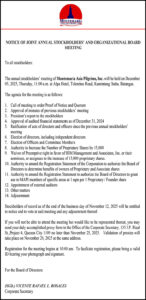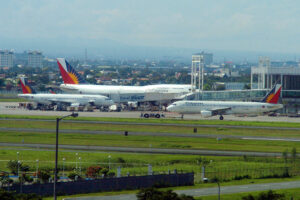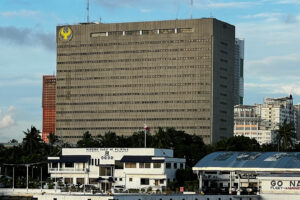The latest World Economic Outlook from the International Monetary Fund delivered a stark warning: global growth is slowing, and the risks are heavily tilted downwards. Despite moments of eased tension in trade, volatility remains a persistent threat, demanding a sophisticated and globally-minded response.
For nations like the Philippines, these global headwinds – slowing growth, inflation risks, and geopolitical instability – represent serious challenges. But a deeper concern lies in the nation’s capacity to navigate these complexities when domestic foundations are so fragile.
The IMF’s recommendations aren’t abstract theories, but practical defenses against global turbulence. The call is clear: rebuild financial reserves, commit to genuine fiscal consolidation, and restore market confidence through transparent and sustainable policies.
Equally crucial are structural reforms designed to boost productivity and long-term potential. Protecting central bank independence from political interference and inflationary populism is paramount. Industrial policy, while potentially beneficial, must be carefully considered to avoid stifling private initiative and adding to the fiscal burden.
These aren’t optional ideals, but strategic blueprints for economic survival. Dismissing them is a dangerous gamble, inviting self-inflicted crisis. The true test lies not in crafting the strategy, but in its effective execution.
The Philippines’ recent economic performance exposes the high cost of chronic execution failures. Preliminary data suggests another slowdown in growth during the third quarter, falling short of the projected target. Market signals – fluctuating equities, weakening sentiment, and a cooling Purchasing Managers’ Index – all point to a loss of momentum.
Even if the Bangko Sentral ng Pilipinas (BSP) finds justification for monetary easing, domestic transmission is hampered by eroding public trust and deepening political uncertainty. This undermines investor confidence, triggers capital outflows, weakens the national currency, and fuels inflation.
Economic Planning Secretary Arsi Balisacan recently admitted a shift in perspective, stating, “I am not as optimistic as I used to be.” This candid assessment reflects a harsh reality: no economy can flourish amidst political instability and a lack of confidence in governance.
The most glaring evidence of domestic dysfunction isn't found in economic charts, but in the devastating reality of flooded homes and submerged streets. We often attribute these disasters to climate change, heavy rainfall, or informal settlements, but the root cause is a failure of governance and a lack of coherent urban planning.
In Cebu, recent floods weren't simply “acts of nature,” but the direct result of years of unchecked urbanization, deforestation, and damaged natural drainage systems, as local officials acknowledged. Villages have encroached on mountainsides, forests have been stripped bare, and natural waterways have been destroyed, often with official consent or neglect.
Regulatory enforcement remains weak. Mining and quarrying operations proceed without adequate erosion control, reforestation, or water management. The most vulnerable populations bear the brunt of this institutional decay – families stranded on rooftops, vehicles swept away, livelihoods destroyed. Tragically, at least 85 lives were lost, and hundreds of thousands displaced, highlighting these as policy failures, not natural tragedies.
The collapse of basic flood control systems – projects specifically designed to prevent these disasters – starkly illustrates the failure of governance. Cebu’s admission that existing infrastructure “did not do its job” reveals a systemic problem. Reports of abandoned projects, substandard materials, and flawed designs blocking waterways point to corruption and impunity, not mere incompetence.
When public funds intended for essential infrastructure are diverted or stolen, the losses extend far beyond monetary value. Classrooms, hospital equipment, and the very foundation of a functioning economy are compromised.
The ongoing investigations by the National Bureau of Investigation (NBI) and the Independent Commission for Infrastructure (ICI) are therefore crucial. They must expose wrongdoing, lead to prosecutions and convictions, and demonstrate that accountability matters.
Transparency and accountability aren’t optional virtues; they are the most vital structural reforms a developing economy can undertake. Without integrity in public spending, fiscal consolidation is meaningless, and every global opportunity is squandered.
To break this cycle of dysfunction, the Philippine government must prioritize immediate, integrity-centered reforms that elevate local execution to best practices. The procurement process needs reform, prioritizing quality and transparency over simply the lowest bid.
“Disaster-proofing” clauses should be integrated into all major contracts, requiring independent third-party monitoring and blacklisting contractors who use substandard materials or fail to complete projects. The ICI should possess genuine investigatory and punitive powers to deter systemic corruption.
The budget process must be depoliticized. Flood control and environmental funds should no longer be treated as political slush funds. Budgeting should be science-based, with fund releases tied to rigorous, publicly disclosed feasibility studies by independent experts. Disaster risk reduction should be integrated into the national budget, making environmental and urban planning prerequisites for major development permits.
Local governance and accountability must be fiercely protected. The excuse of climate change should no longer be used to justify poor governance. Local Government Units (LGUs) must enforce environmental and zoning laws – reforestation, river protection, and waste management – without exception.
Violations causing public harm, such as deforestation of protected areas, must be met with swift and severe penalties. For all public officials, the Statement of Assets, Liabilities, and Net Worth (SALN) must be fully transparent, and unexplained wealth should trigger automatic investigation and prosecution. Public service must once again mean public accountability.
Responsible resource extraction must be the norm, not the exception. Pre-operation audits and independent verification of erosion control should be strictly enforced. Reforestation and water management plans should be mandatory for mining and quarrying firms, with non-compliance resulting in suspension and financial penalties.
These are not aspirational goals, but minimum requirements for credibility and competence. The Philippines cannot continue to allow governance failures to negate every global opportunity. Global markets set the pace, but our ability to participate and adapt depends on the integrity and robustness of our political, economic, and justice systems.
Former IMF economic counsellor Kenneth Rogoff recently echoed former US Treasury Secretary John Connally’s famous statement in his new book, “Our Dollar, Your Problem,” highlighting America’s global economic dominance. For the Philippines, this should prompt introspection and reform.
We can no longer tolerate “Our Corruption, Your Disaster.” The demand must now be: “Our Governance, Our Prosperity.” The Philippines possesses the talent, resources, and policy roadmaps offered by global institutions. What it lacks is the political will and moral discipline to translate plans into tangible results.
Economic policy begins not in boardrooms or international summits, but with the fundamentals: sound infrastructure, honest governance, and dry feet. Until these basics are secured, every ambitious global strategy and domestic policy will remain a house built on shifting ground.






